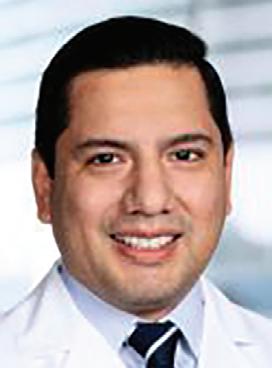LEADING MEDICINE





About 42% of people in the U.S. are obese, and by 2030, research estimates that number will be close to 50%. If you’re among the millions looking to get healthy by losing weight, it’s important to understand your options.
Although your friends may have seen success with losing weight with a GLP-1 RA drug such as Ozempic, you may need to try something different. One size doesn’t always fit all when it comes to losing weight — and keeping it off.
“Obesity is complicated, and losing weight is hard,” said Dr. Dexter Turnquest, general and bariatric surgeon at Houston Methodist Willowbrook Hospital. “Even when you’ve had successful surgery, it requires a lot of work to maintain a healthy weight range.”
There is no magic method that can help you lose weight overnight. Surgery, medications and lifestyle modifications all require you to change your habits and make major lifestyle changes, but the health benefits of losing weight can be significant.
Not all patients qualify for bariatric surgery. Turnquest noted you must meet the following guidelines:
■ Be age 18 or older (adolescents may be eligible at participating facilities).
■ Have a body mass index (BMI) of 35 or higher with an obesity-related condition, or 40 or higher without a condition. To get a full picture of whether you qualify for weight loss surgery, talk with a doctor about your circumstances and weight loss goals.
Our bariatric surgeons have decades of experience in minimally invasive procedures to help you lose weight. Your surgeon will help you decide which option is right for you based on your BMI,
medical conditions and future health goals. Types of surgery at Houston Methodist include:
■ Gastric Bypass: Creates a small pouch from the stomach, and connects it to the middle of the small intestine for an average of 30-35% weight loss
■ Gastric Sleeve: Permanently removes two-thirds of the stomach for an average of 25-30% weight loss
“Bariatric surgery is just one part of a comprehensive treatment because obesity is a complex condition that doesn’t have a single cause,” Turnquest said.
GLP-1 RA medications like Ozempic, Saxenda and Mounjaro can help patients manage weight and blood sugar. Some patients can lose as much as 20% of their starting weight without surgery. Although these drugs have become popular, they may not be the “miracle” solution for everyone.
These medications have side effects like nausea and diarrhea, and researchers are still uncertain about their long-term effectiveness. Surgery still tends to be a better long-term solution for weight loss for those who qualify.
“Our goal is to provide comprehensive care that meets your unique needs,” Turnquest said. “While many people are turning to medications like Ozempic, seek a doctor who guides you through all available options, whether medical or surgical. Your treatment should include a holistic path to better health and well-being.”


Your spine is a complicated structure: It must be strong enough to provide structure and support to your body, but not so rigid that you can’t bend and move as needed. When the components of your spine don’t align or function properly, it can lead to pain or neurological symptoms such as numbness and weakness.
“A spine issue is often felt as either neck or back pain, depending on where the problem is occurring exactly,” said Dr. Einar Bogason, a neurosurgeon at Houston Methodist Spine Center at Willowbrook. “The underlying cause is commonly some type of degenerative change in the spine, which becomes more prevalent with age.”
Not all neck or back pain is caused by a spine condition, such as sciatica or spinal stenosis. Muscle sprains and strains due to overuse or injury can also lead to pain. So can poor posture. Bogason explained the five signs it’s time to see a spine expert:
1.
If neck pain or back pain lingers for weeks or months, it’s likely time to see a spine specialist for a thorough evaluation. “We want to ensure we’re not missing a problem related to the spine, such as disk degeneration or nerve compression,” Bogason explained.
2.
Some spine problems cause obvious pain, but not all. Instead, weakness, numbness or tingling in the hands might be the more noticeable symptoms, especially if they can’t be explained by common causes — like carpal tunnel syndrome, tennis elbow, golfer’s elbow or neuropathy. “If it’s spinal stenosis and we don’t intervene, the condition can progress and may eventually affect the legs,” Bogason added.
3. NECK PAIN THAT IS ACCOMPANIED BY ARM PAIN
A herniated disk can put pressure on nerves in the spine and cause neck pain. “When symptoms start to evolve and pain is no longer limited to your neck and travels down into the arms, hands or fingers, that indicates that it’s more likely to be a problem with the spine,” Bogason said.
Similar to how neck pain that travels to the arm can be a warning sign, back pain that extends into lower extremities can also signal a problem originating in the spine.
Bogason added that when symptoms have progressed to this stage, more advanced treatments are often needed. A spine specialist can help determine the best way to manage the condition.
5.
“We always start with the least risky options — physical therapy, over-the-counter pain relievers — but if these aren’t working, there are several other treatments we can try,” Bogason said. Treatment options range from prescription medications and nerve-targeting injections to, in some cases, surgery.
A spine specialist can help you understand your treatment options, and which is best based on your specific condition and lifestyle. •
When you need a solution to your pain, our spine specialists at Houston Methodist Spine Center at Willowbrook can help. To schedule an appointment, visit houstonmethodist.org/spine/willowbrook or call 281.737.7463


Your primary care provider (PCP) is a long-term partner to help in your quest for better health. With regular wellness exams and age-appropriate screenings, your PCP understands your needs and can help catch harmful health issues that don’t have obvious symptoms.
“As your primary care provider, I can offer you the best treatment recommendations tailored to your needs,” said Dr. Gustavo David Villamar, a family medicine doctor with Houston Methodist Primary Care Group at Willowbrook. “That’s why continuing care with the same PCP is important.”
To help manage your overall health and well-being, your PCP is your best resource. Ask about a new health fad, immunizations, hurts, pains and even your worries. Your doctor is there to listen.
When it comes to the latest diet trend or learning about immunizations, instead of asking Google for advice, start with your doctor. After all, he or she understands your health history and c an guide you based on clinical evidence.
“There is a lot of misinformation online regarding medication side effects, fad diets and dietary supplements. I am here to advise and help you understand the latest clinical guidelines to make sure you are doing no harm to your health,” Villamar said.
Everyone should get an annual flu shot, as well as a tetanus, diphtheria and pertussis (Tdap) or a tetanus diphtheria (Td) booster every 10 years. Your doctor may also recommend vaccines based on your age and health history, or if you have international travel plans.

There are things you can’t really miss — acid reflux, asthma, urinary tract infections.
Unfortunately, some chronic health conditions, such as high blood pressure, prediabetes and high cholesterol, can lurk quietly in the background. Having an annual wellness exam with your primary care doctor can help uncover these conditions.
Depending on your age and family health history, your PCP may recommend other health and wellness exams, such as prostate cancer screening or colorectal cancer screening for men.
“If a cancer screening comes back positive, then it’s my job to quickly coordinate with a specialist who manages that condition and make sure you’re seen by him or her in a timely manner,” Villamar explained.
Navigating the health care system alone can be overwhelming. Your PCP can make it easier by briefing specialists such as cardiologists, neurologists or endocrinologists on your health situation.
Afterward, your PCP can help with a continued care plan. “I review the specialist’s findings to have a better understanding of your condition and treatment plan,” Villamar added. “Then I help navigate you through strategies and timely interventions.”
Your PCP is the first person to evaluate your mental health. Health changes that can cause isolation from your daily activities as well as lead to anxiety and depression include:
■ Cancer
■ Childbirth
■ Diabetes
■ Heart attack
■ Hypertension
■ Stroke
“In primary care, we screen for those conditions and can also help with treatment — including treatment for your mental health,” Villamar added. “Sometimes you are started on medications or therapy. If need be, your PCP can help you find a psychiatrist or a therapist to provide continued treatment.”
Whether it’s an acute illness such as a cold or you’re just not feeling right, seek out comprehensive care through an established relationship with your PCP. “Preventive care goes beyond the wellness exam — I am here to support you throughout your life,” Villamar noted. •
Houston Methodist Primary Care Group has more than 45 practices across the Greater Houston area. To find a doctor near you, visit houstonmethodist.org/pcg/northwest or call 713.441.7965 .
Life can get busy, and making time for a doctor’s visit doesn’t always fit into your day. That’s where virtual visits come in — a perfect option for your health and lifestyle. Whether from your bed, couch, kitchen or hotel, your doctor can see you.
Follow-up care and many common health issues can be addressed via video visits, such as:
To get quick access to care, visit houstonmethodist.org/ pcg/northwest and schedule a virtual appointment with one of our primary care providers.

A gynecologist specializes in women’s health, with expertise in caring for the reproductive system and addressing related health concerns. Dr. Sarah Hoopes, an obstetrician and gynecologist at Houston Methodist Obstetrics and Gynecology Associates at Willowbrook, shared some signs that indicate it’s time to visit your gynecologist.
Whether it’s cramping, bleeding or something else, period symptoms rarely feel “normal.” But how can you tell when they’re actually abnormal?
An abnormal period may look and feel like:
■ Unexpected bleeding outside of your regular cycle
■ Bleeding that lasts longer than a week
■ Heavier-than-usual bleeding
■ Cramping before and with the cycle
■ Cramping so painful you stop activities
“If you notice a pattern of consecutive periods being significantly more severe than usual, it may indicate an underlying issue,” Hoopes explained.
Bleeding between periods isn’t always cause for alarm. You might experience spotting during ovulation or if you happen to miss a dose of your birth control pill. During the years leading up to menopause, many women experience cycle irregularity, such as multiple periods in a month, shorter or longer cycles, or skipping periods altogether. These changes are a normal part of the transition.
“We pay close attention to post-menopausal bleeding,” Hoopes noted. “While it’s not always a sign of something serious, it can indicate underlying issues, so addressing it without delay is important.”
If you have pain in your pelvis during exercise or intercourse, it’s time to see a gynecologist. This can be a sign of an ovarian cyst, endometriosis or a pelvic floor disorder. Additional warning signs may include abdominal bloating, fever and vomiting.
“An ovarian cyst is a fluid-filled sac that can form in the ovaries,” Hoopes explained. “Many ovarian cysts are normal but sometimes they can become enlarged or ruptured leading to pain that could send someone to the emergency room.”

While hormonal testing is sometimes helpful, it’s not always necessary before consulting with your gynecologist about perimenopause.
“I often talk with my patients about symptoms that should be brought to my attention, including bleeding abnormalities or debilitating hot flashes,” Hoopes said. “If a cycle length becomes shorter than 21 days or bleeding lasts longer than seven days, we should evaluate that further.”
Your doctor will help with your quality of life during this transition.
A mammogram or breast ultrasound can help determine whether breast pain, a lump or skin changes is cause for concern. Your gynecologist can assess the situation and advise on the urgency of imaging. It’s important to get your yearly mammogram, if you are age 40 or over, or if you have a family history of breast cancer, to stay on top of your breast health.
“Most breast concerns require further evaluation by a radiologist,” Hoopes explained, “but we can examine the lump to assess the pain and guide you through the next steps.”
Urinary tract infections (UTIs) are common among women of all ages, and your gynecologist is highly experienced in effectively managing this uncomfortable issue.
Your gynecologist or primary care provider can assess UTI symptoms and prescribe antibiotics over the phone. But if you’ve taken your antibiotics and feel like you are not improving, that’s worth a trip to the clinic.
A well-woman exam may include a Pap test, breast exam and pelvic exam depending on your age, screening guidelines and risk factors. “With HPV testing and vaccination, you may not need a yearly Pap smear,” Hoopes said. “Based on your age and individual risk sometimes three to five years is sufficient.” •
To schedule an appointment with Houston Methodist Obstetrics and Gynecology Associates at Willowbrook, visit houstonmethodist.org/obgyn-midwifery-wb or call 281.737.0100.


Dr. Fernando Ramirez-Del Val
Coronary artery disease (CAD) is a type of heart disease that affects the arteries responsible for supplying oxygen-rich blood to the heart muscle. It happens when “fatty” deposits called plaque accumulate within the arteries, a process known as atherosclerosis.
“When plaque builds up in the arteries, it can cause them to narrow and harden,” explained Dr. Fernando Ramirez-Del Val, a cardiothoracic surgeon at Houston Methodist DeBakey Heart & Vascular Center at Willowbrook. “This restricts blood flow to your heart muscle, which can result in serious and life-threatening conditions, such as heart attack or sudden death.”
While chest pain is the most common symptom of CAD, early signs can also include shortness of breath and indigestion, which may indicate a potential blockage. If left untreated, CAD can lead to additional complications, including congestive heart failure and death.
Making healthy lifestyle changes, such as increasing your physical activity, can help reduce your risk for CAD. You can also try the Mediterranean diet, which is rich in veggies, fruits, whole grains and olive oil. A few extra food tips include:
■ Avoid saturated fats: Cheese, butter and fatty meat
■ Prioritize complex carbs: Quinoa and oats
■ Skip starchy carbs: Potatoes, white bread and baked goods
You can also get a coronary artery calcium (CAC) scan. If the CAC scan reveals a significant plaque burden — meaning a buildup of calcium in the arteries, which can increase the risk of heart disease — your doctor may recommend medications such as statins, beta-blockers or aspirin, along with lifestyle changes to help manage the risk.
“Unfortunately, plaque buildup usually cannot be reversed,” Ramirez-Del Val explained. “But effective management of CAD can help prevent further buildup and slow the progression of disease.”
Statins, a type of cholesterol medication, not only lower cholesterol levels but also stabilize plaque and reduce inflammation in the arteries.
Your primary care provider (PCP) or cardiologist may also recommend medications such as beta-blockers to alleviate stress on the heart muscle, while low-dose aspirin may be prescribed to prevent blood-clot formation.
“While it’s ideal to prevent heart disease through a healthy lifestyle, there’s still plenty of hope for those with coronary artery disease,” Ramirez-Del Val emphasized. “Medications, therapies and simple lifestyle changes can have a big impact on your health. Following your doctor’s guidance closely can really enhance your overall well-being.” •
Most people with CAD can maintain an active lifestyle. It’s important to discuss any activity limitations with your doctor. Those without specific risk factors, such as severe heart failure, should aim for at least 150 minutes of moderate intensity exercise each week, such as:
■ Brisk walking
■ Cycling
■ Swimming Don’t let heart disease control your lifestyle. To learn more visit houstonmethodist.org/debakey/ willowbrook or call 281.737.2500














We offer a full spectrum of care, including:
• Primary care physicians for you and your
• Specialists with innovative treatments and customized programs for all conditions, including cutting-edge orthopedic,
• Collaborative teams of experts using the newest technologies and latest research